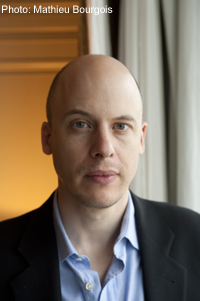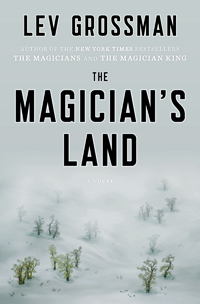At the end of Shakespeare’s play The Tempest, the sorcerer Prospero delivers a dramatic monologue about retiring his supernatural powers to return to his mundane life. “[T]his rough magic,” he announces, “I here abjure.” By contrast, Quentin Coldwater, the twenty-nine-year-old protagonist of Lev Grossman’s The Magician’s Land, has been stripped of his magical powers and title of king, and he sorely misses both.
 In The Magicians, the first book in this fantasy trilogy for adults, Quentin happens upon a world of magic—and his own innate gifts as a magician—when his admissions interview at Princeton goes seriously awry. By sheer chance, he learns about Brakebills College for Magical Pedagogy, the only school of its kind in North America. At this college a hundred miles away from his home in Brooklyn, Quentin faces an entrance exam so elaborate it demands, among other tasks, that he create an entirely original language and then translate an excerpt from The Tempest into it. This detail, in a captivating scene in a novel filled with memorable moments, is Grossman’s wink to the audience, a way of letting readers know that this novel, like Shakespeare’s drama, is not a tale of simple heroism.
In The Magicians, the first book in this fantasy trilogy for adults, Quentin happens upon a world of magic—and his own innate gifts as a magician—when his admissions interview at Princeton goes seriously awry. By sheer chance, he learns about Brakebills College for Magical Pedagogy, the only school of its kind in North America. At this college a hundred miles away from his home in Brooklyn, Quentin faces an entrance exam so elaborate it demands, among other tasks, that he create an entirely original language and then translate an excerpt from The Tempest into it. This detail, in a captivating scene in a novel filled with memorable moments, is Grossman’s wink to the audience, a way of letting readers know that this novel, like Shakespeare’s drama, is not a tale of simple heroism.
The Magicians sees Quentin and his friends through the normal adolescent adventures and alcohol- and hormone-fueled entanglements, but it also plants the seeds for relationships that will come to be some characters’ undoing and others’ salvation. The second book in the series, The Magician King, tracks Quentin’s reign as king of Fillory and his subsequent banishment. At the start of The Magician’s Land, Quentin is angling to get back to Fillory even as the end of the enchanted land allegedly draws near.
 Six months before the start of The Magician’s Land, Grossman writes, Quentin had been “kicked out of Fillory, and he’d been kicked around a fair bit since then, and now he was just another striver, trying to scramble back in, up the slippery slope, back toward the light and the warmth.” To that end, Quentin spearheads a team of magicians of questionable moral standing—including Plum, who has been expelled from Brakebills—to track down a mysterious leather suitcase. They know that the suitcase, which can only be unlocked by magic, is in the possession of two murderers somewhere along the eastern seaboard; its contents are unknown but presumed to be invaluable.
Six months before the start of The Magician’s Land, Grossman writes, Quentin had been “kicked out of Fillory, and he’d been kicked around a fair bit since then, and now he was just another striver, trying to scramble back in, up the slippery slope, back toward the light and the warmth.” To that end, Quentin spearheads a team of magicians of questionable moral standing—including Plum, who has been expelled from Brakebills—to track down a mysterious leather suitcase. They know that the suitcase, which can only be unlocked by magic, is in the possession of two murderers somewhere along the eastern seaboard; its contents are unknown but presumed to be invaluable.
The story alternates between scenes set in Fillory, where the apocalypse is nigh, and a New York townhouse, where Quentin and Plum obsessively attempt to use an ancient spell to create a new land for magicians. Into the midst of this mayhem appears Alice, who once sacrificed her own life to save Quentin’s. He’s been living with the guilt for ten years. The good news: she’s not dead; the bad news: she’s now “a wasp who’d been trapped in a jar and then shaken, and she was ready to sting.” The obstacles that block Quentin’s dream of casting his own magician’s land appear nothing short of insurmountable, and therein lies the thrill of this book.
Some have called this bestselling series, which originated in 2009, to Harry Potter for adults, and it’s true that both stories contain spirited, otherworldly details, massive audiences, and a wealth of literary and cultural allusions. Grossman’s previous novels include Codex and Warp, and he works, too, as the book critic for Time magazine. The range of his references is staggering.
So much of what’s appealing about Grossman is on display in the 400-plus fantastical pages of The Magician’s Land: his easy way with grandly deployed plotlines, his nuanced attention to the ways men and women communicate (or fail to). His taut pacing, a key to successful thrillers, is carried out by flawed characters addressing distinctly un-thrilling, mortal themes, such as how to escape from past sins and how to live in a world that guarantees neither safety nor happy endings. For Quentin and his friends—most of whom have lived in protracted adolescence well past their Brakebills years—magic is a tremendous gift, but it doesn’t save them from suffering. “He was truly alone in the world now,” Quentin thinks at one point early in the story, “no one was coming to help him. He would have to help himself.” Grossman’s masterful conclusion to this compulsively readable trilogy offers shadows and illumination, villains and heroes (sometimes the same person), and magic both rough and very real.

Sarah Norris holds an M.F.A. in creative nonfiction from Sarah Lawrence College and has reviewed books for The Daily Beast, Christian Science Monitor, San Francisco Chronicle, and Village Voice, among other publications. She lives in Nashville.
Tagged: Fiction





